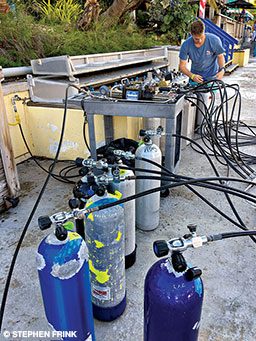Avoiding failure at critical times
It is not always obvious when dive business equipment needs maintenance, and big issues can easily slip under the radar in a busy dive shop. Equipment failures can happen anywhere, especially if we neglect to understand the potential for failure. Routinely servicing your equipment will help keep your business thriving by ensuring the safety of your staff and customers.
It’s easy to get complacent about performing routine equipment maintenance because we think expensive equipment should be made to last longer or that we’ll have more time to do it later. But planned maintenance is key to preventing equipment failures.
When dive shop equipment breaks — which is usually when we least expect it or when we are least prepared to handle the aftermath — it could seriously injure you, your staff or your clients. The costs to repair the resulting damage are often much more than preventive maintenance costs. Avoid unexpected equipment loss, which can hurt your dive operation and your income, by performing appropriate, routine maintenance.

Some common major maintenance items among dive businesses include rental dive gear, cylinders, a filling station (which includes a compressor, filtration system, filling whips and interconnecting pipework), boats and vehicles. Other items we might tend to overlook are fire alarms, smoke detectors, fire extinguishers and emergency first aid equipment.
The need for maintenance is a function of age, complexity, condition and use. Dive shop equipment needs to be cleaned, lubricated, inspected, serviced and tested. To overcome the obstacles of time, money and resources, create a maintenance plan. Consider all the items of concern, and then determine what basic checks, services and interventions are regularly needed. Identify the steps to take to complete the maintenance, and acquire the necessary tools and materials.
Have essential spare parts for every piece of equipment, and remember that you get what you pay for. Using good, reputable parts ensures more reliable equipment; the slightly higher cost of quality parts is much lower than the cost of a repair or total replacement.
Provide an appropriate workspace with proper lighting and protective equipment; staff safety should always be a priority. Ensure that personnel have the appropriate training to complete the required maintenance procedures, or consider outsourcing equipment maintenance to a skilled professional.
After you have developed a maintenance plan, purchased needed parts and provided an appropriate workspace, create a schedule for performing necessary and regular maintenance on time. Make short, focused schedules well in advance for the less busy times.
A successful maintenance plan means more reliable equipment, higher confidence in its functionality and a better bottom line for your business.
© Alert Diver — Q2 2019